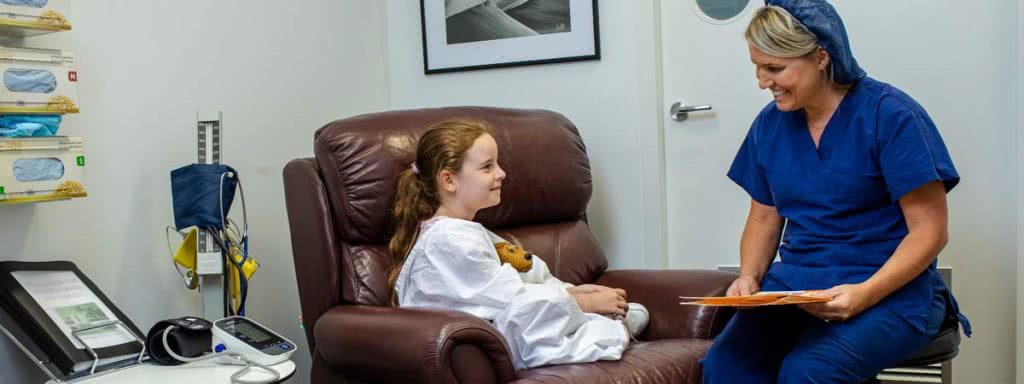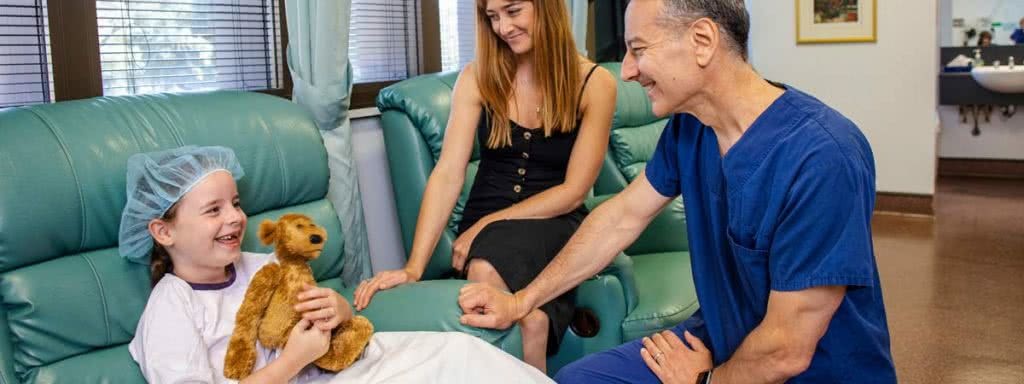
PREPARING YOUR CHILD FOR DAY SURGERY
Be honest with your child and answer all their questions as simply as possible. If you are unsure about how to answer, please ask a member of your health care team to help you explain.
We suggest you tell your child:
- Why they are going to day surgery
- Who they will meet and what will happen when they arrive
- When and how long you will be staying with your child.
We have designed a leaflet ‘The Story of My Anaesthetic’ for you to read to your child to help them prepare for their anaesthetic. It will introduce some of the people that they will meet and some of the things that will happen.
Exposure to infectious diseases
If your child or family member has had contact with anyone who has had an infectious disease such as measles, shingles or chicken pox within three weeks prior to your child’s admission, please notify your surgeon and the day surgery.
If you or your child develops or experiences an infectious condition e.g. chicken pox, vomiting and/or diarrhoea, chest infection or whooping cough, also notify your surgeon and the day surgery.
SURGERY
Fasting for patients having an anaesthetic
Fasting means not eating or drinking for a certain amount of time. It is very important for your child to fast before surgery. If your child has food or fluid in their stomach during an anaesthetic there is a risk that they may vomit, which could then enter the windpipe or the lungs.
Your child must have nothing to eat or drink (not even a sip of water from the time you are told to fast).
Operating theatre

If the anaesthetist agrees, one parent may be allowed into the operating room to stay until your child falls asleep. When your child is asleep, you will be escorted back to the Waiting Room while your child has their operation.
When your child’s operation has finished, you will be called to Recovery to sit with your child after they wake up from the anaesthetic. Only one parent or carer is allowed into Recovery (no brothers or sisters).
After anaesthetic it is normal for some children to become upset. This does not necessarily mean they are in pain and in most cases will usually settle down after a while. Some children remain drowsy after an anaesthetic, it is best to let them sleep.
If your child does feel pain after the surgery, they will be given pain relief medication as required.
When is my child able to eat and drink?
Depending on the type of procedure/operation, food and drink will be slowly given to your child. The medical or nursing staff will inform you when your child may start to eat and drink.
Going home (discharge)
Your doctor and nurse will inform you when your child can go home (be discharged) and arrange for any necessary follow-up appointments.
Books and information for child patients
Reading age-appropriate books about going to hospital is a great way to prepare your child and start conversations about the hospital visit. Books provide your child opportunities to ask questions and explore any worries or misunderstandings they may have.
There are lots of storybook options. Visit your local library or children’s book shop to see what’s available. Here’s a few of our suggestions.
- “Peppa Goes to Hospital” By Lady Bird
- “Going to the Hospital” By Anne Civardi
- “Going to the Hospital- Sticker Book” By Anne Civardi
- “Topsy and Tim go to Hospital” By Jeam and Gareth Adamson
- “My First visit to the Hospital” Bu Eve Marleau and Michael Garton
- “Maisy Goes to the Hospital” By Lucy Cousins
- “Frankin Goes to the Hospital” By Jennings Sharon
When a child goes to hospital, they can feel disconnected from family, siblings, or friends; the books listed below can help children talk about their feelings.
- “My Many Coloured Days” By Dr Seuss
- “In My Heart. A book of feelings” By Jo Witek
- “The Invisible String” By Patrice Karst

